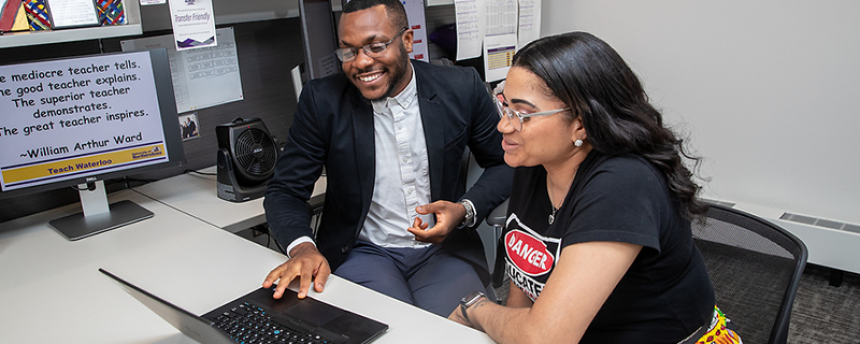Teach Waterloo: Role Models for the Future

For Dawn Boone, a new program offered at the University of Northern Iowa was an opportunity she could not pass up.
Originally from Cleveland, Ohio, Boone came to Waterloo in June 1992 after high school graduation to babysit for her aunt and uncle (Chuck Means, who led minority student affairs at UNI at the time). She enrolled at UNI, started in teacher education, but withdrew. She went on to an associate degree in early childhood education, and then returned to UNI to get her bachelor’s degree in 1999 in leisure services from the College of Education. She has been a Head Start teacher, a behavioral interventionist, a family support counselor and para-educator within the Waterloo Community School District (WCSD).
Then she heard about this new program called Teach Waterloo, offered by the UNI College of Education in conjunction with the WCSD.
This grant-funded program, in partnership with the R.J. McElroy Trust, supports a goal to increase the number of minority teachers to support student success. Changing demographics indicate that minority or underrepresented students of today may be the majority in schools in the near future. When students complete Teach Waterloo, including student teaching, they will be eligible for licensure in Iowa.
Working together, partners in the WCSD and at UNI identified prospective students who are employed as para-educators in the district. Some had their associate degrees while others had their bachelor’s in another field. They were interviewed, selected and then enrolled in the UNI bachelor’s program for elementary education. Classes started in summer 2018 for the cohort as a transition toward fall coursework with fellow COE students.
Boone was one of those first students.
Diversifying the teaching workforce
“There is a need to diversify the teaching workforce because studies have found that minority educators are better positioned to teach and help minority students succeed,” says Stanley Ebede, who coordinated the program at UNI through its first full year of implementation.
Originally from Nigeria, Ebede earned both his master’s and doctoral degrees from UNI. “I have been fully committed to diversity, equity, inclusion and social justice. Based on my experience as a student at UNI, I didn't have many here who looked like me, so the idea behind this excited me,” he says.
“This program will not only increase the number of minority teachers in the near future, but it also increases the number of minority students here at the College of Education. The more we support diversity initiatives like the Teach Waterloo program, the more we are helping to change perspectives in the school environment, too," he says.
A second chance
“I’ve often felt like I’m playing the role of a teacher. I was a para (educator) for 11 years, so I always wanted to be a teacher,” Boone says. “I feel like Teach Waterloo is a great choice, there is no turning back.”
Though familiar with the classroom setting, Boone had a new perspective when she participated in her Level 2 field experience at Lou Henry Elementary in Waterloo in May.
“It was still new for me. Although a lot of paras do a lot of what they consider to be teaching, you now look at it in a totally different way. Now, you’re assessing the kids, you have objectives and goals. Before, we got worksheets and it was just helping get it done. Now behind the scenes, you know the student needs to be proficient,” she says.
“It’s really exciting to be positioned to support people that look like me, in a professional way,” adds Ebede, who moved on to a new position in Pennsylvania as the program entered its second year. “I know what it took me to be where I am today, so to be here and see them grow as an individual and as a professional, that means a lot.”
Boone looks forward to working at the elementary level and already knows her classroom “is going to be very movement oriented and arts integrated, that’s where learners are going.”
She says she feels more comfortable and prepared for her second chance at getting her teaching degree. “I wouldn’t dare want to mess this up. I appreciate it and that’s why I work hard and do my best," says Boone, among the recipients of a Kappa Delta Pi International Honor Society scholarship this year. "When you have your mind made up, and you’re dedicated to something, it’s always rewarding.”
